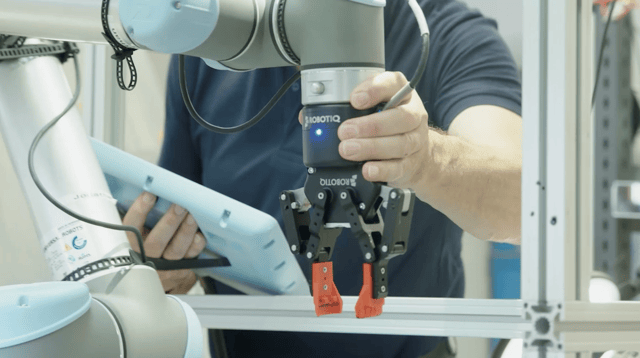What are the Right Skills to Integrate a Robot

Posted on Jan 04, 2018 7:00 AM. 2 min read time
In the past, implementing robots was expensive because it required highly-skilled employees to program and maintain them. This is no longer the case with collaborative robot solutions. In fact, many employees you currently have can be trained to program collaborative robots. Simple programs are easy to teach, and additional training can give them the ability to tackle more complex tasks.
Join us today as we look at an exciting eBook from Robotiq that discusses the skills your employees need to properly integrate collaborative robots into your workplace.

The People and Skills You Need to Integrate Robots
The first step the eBook discusses is the people you will need to properly integrate robots into the workforce. It consists of four people total:
● Robert, the general manager who is looking to increase productivity
● Matthew, the director of operations who is leading the company’s automation projects
● James, the lead engineer who is responsible for this robotics project
● Sabrina, the line lead who represents the floor workforce
The eBook then delves into each of these roles, using the fictional employees as examples of how to properly prepare and train your employees. For example, the general manager monitors shifts and prepares for upcoming jobs.
He is the one to give the green light on the robot project and sets everything into motion. He needs to focus on being budget-conscious, making good decisions, communicate well, and monitoring results.
The eBook goes into details for each of the example employees, focusing on their roles in the project, and where their focus should be for the ideal results. While the operation manager is results oriented, the engineer is more focused on complex problem-solving. These are just examples of how drastically different the roles can be, but also how they fit together.
The next portion of the eBook focuses on the specific steps to integrating a robot. They include the following:
● Determine needs
● Evaluate complexity
● Evaluate ROI
● Project management
● Design cell
● Integrate
During these steps, the eBook poses simple question to ask yourself, questions that help you better establish your needs and understanding of the steps. The eBook also breaks down these steps into specific actions and considerations for maximum efficiency.
There are also links provided to other Robotiq eBooks that expand on some of the topics discussed in this book, allowing readers to further expand their knowledge of these steps and increase their chances of success.
Final Thoughts
Robots are about a lot of things: electronics, mechanics, devices, and programming. The most important thing about all of this, as the eBook states, is the people. The difference between a good integration and a great one comes down to the people and how they work together to make it happen.
It starts with the general manager, who sets up the big picture view of everything, followed by the other teams members who all add their own piece to the puzzle. Check out this, and the other Robotiq eBooks to learn more about the exciting world of collaborative robotics!



Leave a comment